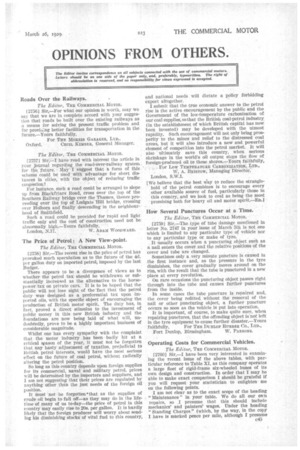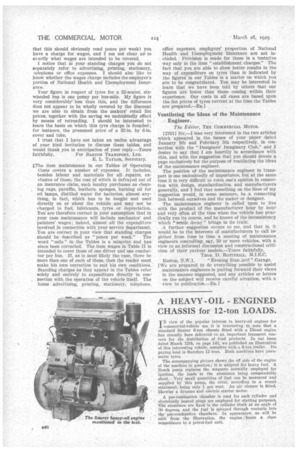OPINIONS FROM OTHERS.
Page 75

Page 76

If you've noticed an error in this article please click here to report it so we can fix it.
The Editor invites correspondence on all subjects connected with the use of commercial motors. Letters should be on one side of the paper only, and, preferably, typewritten. The right of abbreviation is reserved, and no responsibility for views expressed is accepted.
Roads Over the Railways. • • The Editor, THE COMMERCIAL MOTOR.
[27561 Sir,—For what our opinion is worth, may we say that we are in complete accord with your suggestion that roads be built over the existing railways as a means for solving the present traffic problem and for provhi:ng better facilities for transportation in the future.—Yours faithfully.
For THE MORRIS GARAGES, LTD., Oxford. CECIL KIMRER, General Manager.
The Editor, THE COMMERCIAL MOTOR.
[2757] Sir,I have read with interest the article in your journal regarding the road-Over4ailway system . for the future May . I suggest that It :form of this scheme Could be used With advantage for short distances in cities, with the objeet of reducing' traffic congestion?
For instance, such a road Mild be arranged to slope up from Bla.ckfriars Road, eross over the .top of the Southern Railway bridge over the Thames, thence proceeding over the top of Ludgate 'Hill bridge, crossing over Holborn and finally descending in the neighbourhood of Smithfield.
Such a road could be provided for -rapid and light • traffic only and the cost of construction need not be: abnormally high.—Yours faithfully,
London, N.17. . W. ADAM WOODWARD.
The Price of Petrol: A New View-point.
The Editor, THE COMMERCIAL MOTOR.
[2758] Sir,—The recent rise in the price of petrol has provoked much speculation as to the future of the 4d. Per gallon duty on imported petrol, imposed by the last Budget. There appears to be a divergence of views as to whether the petrol tax should be withdrawn or substantially increased as the alternative to the horsepower tax on private cars. It is to be hoped that the public will not lose sight of the fact that the petrol duty was designed as a preferential tax upon imported oils, with the specific object of encouraging the production of British motor spirit. The duty has, in fact, proved a direct stimulus to the investment of public money in this new British industry and the foundations are now being laid of what will, undoubtedly, prove to be a highly important business of considerable magnitude.
Whilst one has every sympathy with the complaint that the motor industry has been badly hit at a critical season of the year, it must not be forgotten that any hasty adjustment Of taxation, prejudicial to British. petrol interests, would have the most serious effect on the future of coal petrol, without radically altering the petrol position.
So long as this country depends upon foreign supplies for its commercial, naval and military petrol, prices will be determined by the importers and suppliers, and I am not suggesting that their prices are regulated by anything other than the just needs of the foreign oil position.
It must 'not be forgotten•that as the supplies of crude oil begin to fall off—as they may do in the lifetime of many of us to-day—the price of petrol in this country may easily rise to 20s. per gallon. It is hardly likely that the foreign producer will worry about sending his diminishing stocks of vital fuel to this country, and national needs will dictate a policy forbidding export altogether.
I submit that the true economic answer to the petrol rise is the active encouragement by the public and the Government of the low-temperature carbonization of our coal supplies, so that the British coal-petrol industry (in the establishment of which British capital has now been invested) may be developed with the utmost rapidity. Such encouragement will not only bring prosperity to the mines and relief to the distressed coal areas, but it will also introduce a new and powerful element of competition into the petrol market. It will also • ultimately save this country, when serious shrinkage in the world's oil output stops the flow of foreign-produced• oil to these shores.—Yours faithfully,
• For Low .TEMPERATURE CARBONIZATION,, LTD., W, A. BRISTOW, Managing Director. London, S.W.1.
[We believe that the best Way to reduce the strangle' hold of the petrol combines is . to encourage every .other available source of fuel, particularly those in this country, and we look to coal as being the most promising both for heavy oil and motor spirit.—EDA • How Several Punctures Occur at a Time.
The Editor, THE COMMERCIAL MOTOR.
• [27591 Sir,---The type of tube damage mentioned in letter No. 2747 in your issue of March 5th is not one which is limited to any particular type of vehicle nor to any particular type or make of tyre.
It usually occurs when a puncturing object such as a nail enters the cover and the relative positions of the cover and tube are changed.
Sometimes only a very minute puncture is caused in the first instance and, as the pressure in the tyre diminishes, the cover gradually moves around on the rim, with the result that the tube is punctured in a new place at every revolution.
On rare occasions the puncturing object passes right through into the tube and causes further punctures from the inside.
In some cases the tube puncture is repaired and, the cover being refitted, without the removal of the nail or other puncturing object, a further puncture occurs so soon as the vehicle is put into operation.
It is important, of course, to make quite sure, when repairing punctures, that the offending object is not left in the tyre equipment to cause further disaster.—Yours faithfully, For THE DUNLOP RUBBER CO., LTD.,
Fort Dunlop, Birmingham. W. PARSONS.
Operating Costs for Commercial Vehicles.
The Editor, THE COMMERCIAL MOTOR. [2700] Sir,—I have been very interested in examining the recent issue of the above tables, with particular reference to Table XI, as this company operates a large fleet of rigid-frame six-wheeled buses of its own design and construction. In order that I may be able to make exact comparison I should be grateful if you will request your statistician to enlightenme on the following points.
I am not clear as to the exact scope of the heading " Maintenance " in your table. We do all our own repairs, so I presume that this should include mechanics' and painters' wages. Under the heading "Standing Charges (which, by the way, in the copy I have is marked pence per mile, although I presume c45 that this should obviously read pence per week) you have a charge for wages, and I am not clear as to exactly what wages are intended to be covered.
I notice that in your standing charges you do not separately refer to advertising, printing, stationery, telephone or office expenses. I should also like to know whether the wages charge includes the employer's portion of National Health and Unemployment Insurance.
Your figure in respect of tyres for a 32-seater, sixwheeled bus is one penny per bus-mile. My figure is very considerably -less than this, and the difference does not appear to be wholly covered by the discount we are able to obtain from the makers' retail list prices, together with the saving we undoubtedly effect by means of retreading. I should be interested to learn the basis on which this tyre charge is founded ; for instance, the presumed price of a 32-in. by 6-in. cover and tube.
I trust that I have not taken an undue advantage of your kind invitation to discuss these tables, and would thank you in anticipation of your reply.—Yours
faithfully, For BARTON TRANSPORT, LTD.
E. L. TAYLOR, Secretary.
[The item maintenance in our Tables of Operating Costs covers a number of expenses. It includes, besides labour and materials for all repairs, exclusive of those, the cost of which is defrayed out of an insurance claim, such undry purchases as cleaning rags, paraffin, leathers, sponges, burning oil for oil lamps, distilled water for batteries, almost anything, in fact, which has to be bought and used directly on or about the vehicle and may not be charged to fuel, lubricants, tyres or depreciation. You are therefore correct in your assumption that in your case maintenance will include mechanics' and painters' wages; indeed, alniost all the expenditure Involved in connection with your service department. You are correct in your view that standing charges should be described as " pence per week." The word " mile " in the Tables is a misprint and has since been corrected. The item wages in Table II is intended to cover those of one driver and one conductor per bus. If, as is most likely the case, there be more than one of each of these, then the reader must make his own correction to suit his own conditions.. Standing charges as they appear in the Tables refer• solely and entirely to expenditure directly in connection with the operation of the vehicle itself. The items advertising, printing, stationery, telephone.
office expenses, employers' proportion of National Health and Unetimloyment Insurance are not inchided, Provision is made for these in a tentative way only in the item "establishment charges." The fact that you are able to show better results in the way of expenditure on tyres than is indicated by the figures in our Tables is a matter on which you are to be congratulated. You may be interested to learn that we have been told by others that our figures are lower than those coming within their experience. Our costs in all cases are based upon the list prices of tyres current at the time the Tables are prepared.—En.]
Ventilating the Ideas of the Maintenance Engineer.
The Editor, TEE COMMERCIAL MOTOR.
[2761] Sir,—I was very interested in the two articles which appeared in the issues of your paper dated January 8th and February 5th respectively, in connection with the "Designers' Imaginary Club," and desire to say that I am heartily in accordance with this, and with the suggestion that you should devote a page exclusively for the purpose of ventilating the ideas of the maintenance engineer.
The position of the maintenance engineer in transport is one undoubtedly of importance, but at the same time it is very difficult to voice one's opinion in connection with design, standardization and manufacturers generally, and I feel that something on the lines of my suggestion would, in some measure, be a connecting link between ourselves and the maker or designer.
The maintenance engineer is called upon to live with the product of the manufacturer hour by hour and very often at the time when the vehicle has practically run its course, and he knows of the inconsistency which ." senile decay " brings in its train.
A further suggestion occurs to me, and that is, it would be to the interests of manufacturers to call together from time to time a meeting of maintenance engineers controlling, say, 50 or more vehicles, with a view to an informal discussion and constructional criticism of their Furious models.—Yours faithfully,
Thos. D. Borrsumm, M.I.E.C.
• Euston, N.W.1. "Evening StanJard " Garage. [We are prepared to do everything possible to assist maintenance engineers in putting forward their views in the manner suggested, and any articles or letters on the subject will receive careful attention, with a view to publication.—ED.I




























































































































